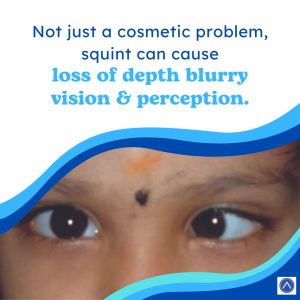Squint

What is Squint Eye?
Squint eye or crossed eye, also known as strabismus, is a condition where the eyes point in different directions and do not move together in alignment. One or both of the eyes or alternating eyes may turn inside, outside, up or down. This may happen some of the time, or may be present throughout the day.
What happens in Strabismus?
Each of our eye has six muscles attached to it, which controls it’s movement. The brain directs these muscles of both our eyes so that they both work in coordination, look in the same direction and help the brain to create one cohesive 3 dimensional image. In strabismus, this control is imbalanced.
What are the causes of squint?
Strabismus is seen due to a problem with the eye muscles or nerves or parts of the brain that control the eye muscles:
- Congenital, which means that a child may be born with it
- Hereditary, or passed on in the family through one’s genes
- Due to eye problems like long sightedness or short sightedness or cataract or eye injuries
- Conditions like cerebral palsy, down’s syndrome, fluid or tumours in the brain
- Conditions like thyroid disease, strokes, head injury, diabetes and myasthenia gravis can cause squint in adults.
Can children outgrow squint?
Many babies may develop squint as their bodies are still learning to control their eye muscles. Some babies do outgrow their squint. However, any baby’s squint that persists beyond 4 months of age, needs to be examined by a squint specialist.
What will happen if a child’s squint is not corrected?
We need both our eyes to be perfectly aligned so that we may see sharp images and perceive depth. In case of strabismus, the brain receives two different images from the two poorly aligned eyes.
Initially this may cause one to have double vision, but the brain is smart enough to overcome this by gradually learning to ignore the incorrect image from the squinty eye. If this is allowed to continue, the brain will permanently shut down the images from the faulty eye and the child may lose it’s vision in that eye forever, something called a lazy eye.
Dr. Prachi Agashe, Paediatric Ophthalmologist and Squint Specialist at Agashe Hospital says, “People think squint is just a cosmetic problem. The fact is that squint can cause reduced vision, double vision, loss of depth perception and peripheral vision. Treating squint at the earliest is important because remodelling the eye-brain connection is easiest when younger and this is precious time when most of the child’s learning is happening through his/her vision.”

How is Squint treated?
Depending on what is causing the squint, the treatment for squint can vary from
- Spectacles or glasses or special prism lenses: In some patients only this treatment may be sufficient.
- Vision Therapy: This includes a structured program of visual activities including eye exercises that improve one’s eye coordination and strengthen the eye brain connection. The squint specialist may encourage the weak eye to work by putting a patch on the stronger eye.
- Eye muscle surgery: Squint specialists will change the length or position of the eye muscles. Infants as young as a few months old to adults who have had squint for years can undergo squint surgery.
How much does squint eye surgery cost?
A lot of patients ask how much does squint eye surgery cost. This question does not have a simple answer. For example, some children can have their squint corrected simply by wearing the correct glasses, while others may need surgery that involves just one eye muscle or multiple eye muscles or even two stage squint surgery. Obviously the cost will vary a lot depending on why one has a squint, how it is being corrected and how complex the treatment is.
How can squint be prevented?
Squint that arises due to genetic factors cannot be prevented. One can prevent squint that arises from some eye conditions by detecting and treating those conditions in time. Off course, once a squint has developed, prompt treatment is necessary to prevent damage to vision from occurring.

Dr. Prachi Agashe is a Paediatric Ophthalmologist and Paediatric as well as Adult Squint Surgeon. Dr. Agashe has a lot of experience with both paediatric and adult squint treatment. Dr. Agashe can be reached at 9867539883 or via email at contactus@agashehospital.com







